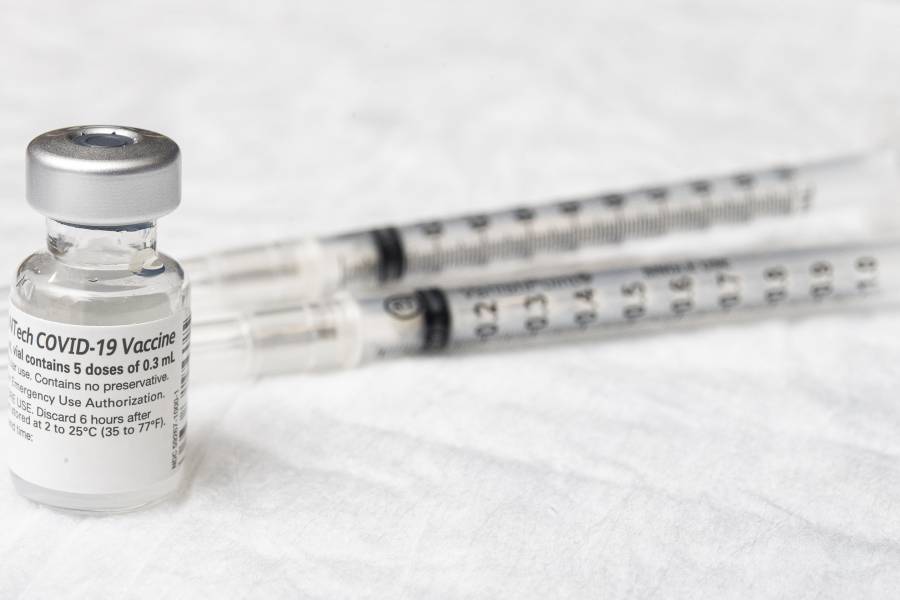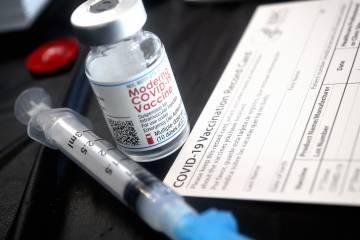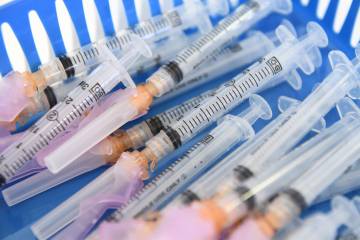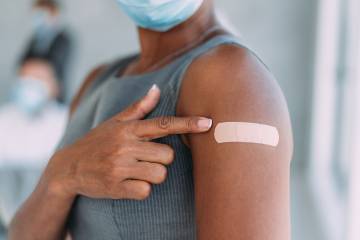It's shaping up to be a big week for news on two eagerly awaited developments involving Pfizer's COVID-19 vaccine: Booster shots and progress toward its first doses for children as young as 5.

Image caption: William Moss
The Food and Drug Administration is set to decide whether to accept its advisory committee's decision to authorize a third shot of Pfizer's vaccine for people 65 and older and other high-risk individuals who have already received the first two doses. The committee rejected the company's request to administer boosters to anyone 16 and over who had received the initial-two dose regimen—a broad strategy President Biden said last month he had wanted to see utilized.
Once the FDA decides how to proceed with its committee's recommendation, the debate moves to the U.S. Centers for Disease Control's Advisory Committee on Immunization Practices, which is scheduled to meet Wednesday and Thursday to determine its own recommendations on who should receive an additional dose.
Meanwhile, Pfizer announced more progress with its children's vaccine, releasing initial study results showing "a favorable safety profile and robust neutralizing antibody responses in children 5 to 11 years of age using a two-dose regimen 10 micrograms administered 21 days apart, a smaller dose than the 30 micrograms used for people 12 and older."
To find out more about the lasted developments, the Hub spoke to Willliam Moss, executive director of the International Vaccine Access Center at the university's Bloomberg School of Public Health and vaccinology lead for the Coronavirus Resource Center.
Does the FDA always follow its advisory committee's recommendations?
I would be surprised if the FDA came out with a different recommendation than its advisory committee. The agency usually follows the committee's advice. But that could happen.
There is still more debate to be had this week within the FDA, the CDC's advisory panel, and the CDC. It would also be unusual for the CDC not to agree with the FDA. There could be some differences at the margins such as what type of health care workers or at-risk adults might also be eligible for the third shot. But by the end of this week we should know who is eligible for a third dose of Pfizer.
Will Moderna vaccine recipients be able to get the Pfizer booster?
No. This FDA panel's decision on booster doses only applies to people who have gotten two doses of the Pfizer vaccine. Pfizer applied for Emergency Use Authorization for the third dose. It won't apply to people who received the vaccine from Moderna or Johnson & Johnson. This isn't about mixing and matching. Moderna has not yet applied for authorization of a third dose of its vaccines.
Why not offer the third shot to everyone?
The U.S. data really suggests that the vaccines remain highly protective against severe disease across all age groups. There was a slight reduction in those older than 65 years old who were the first to be vaccinated. The U.S. data is not showing the same degree of loss of protection that Israeli data has indicated.
The FDA's Vaccines and Related Biological Products Advisory Committee did also agree that health care workers and others at a high risk of workplace exposure should be included in the Emergency Use Authorization for boosters. Both the Pfizer and Moderna vaccines are already approved for third shots for solid organ transplant recipients and others who are similarly immunocompromised.
When would you expect a vaccine to be available for children between 5 and 11?
Pfizer issued a press release on Monday detailing successful results for the vaccine it has been conducting trials on with children from 5 to 11 years old. This means the company has enough data for drawing conclusions about the safety and the immunogenicity of the two-dose regimen for children 5 to 11 years old. The company is not looking at efficacy, or how well the vaccine protects against disease; it's looking at antibody responses and comparing them to the antibody responses in older people. Pfizer will likely submit its data officially to the FDA by the end of September. We could expect to see authorization of a Pfizer vaccine for this younger age group by the end of October.
Is the Pfizer vaccine dose for children the same as the vaccine dose for adults?
In its trials Pfizer conducted a dose escalation. The company started with a small dose and increased it to examine antibody response as well as tolerability or side effects. The dose for people 12 and over is 30 micrograms. The dose the company announced Monday was 10 micrograms, a third of the adult dose. This is the first time we are seeing results for these type of mRNA vaccines in children of this age group.
Did Pfizer use the same interval between the first and second doses for children as with adults?
What's interesting is that Pfizer did use the same interval of 21 days between its first and second doses for children under 12 as they did for older people. The interval with Moderna is four weeks.
Moderna's data has been showing higher protection or efficacy than the Pfizer vaccines. And some scientists have speculated that Moderna's four-week interval between its two doses could be part of the reason. Moderna also uses a much higher dosage of 100 micrograms.
Pfizer stuck to the three-week interval for children and the company may not have any basis for changing the interval. It was probably the safest move to make. But it could be that a longer interval is better because it gives the immune system time to reset and respond. The original trials used the shorter intervals in part because they wanted to get the trials done faster.
Will authorization of boosters only for people over 65 make more vaccines available for overseas?
The position from many, including the World Health Organization, is that the richer nations like the United States should not be providing boosters to their entire populations. They've been fair to support the United States if it offers third doses to immunocompromised people or those over 65. A decision on boosters for those 65 and over may likely be followed by an announcement about the U.S. support for the global effort to donate and deliver vaccines to nations with low vaccination rates.
Posted in Health, Voices+Opinion
Tagged william moss, covid-19 vaccine, boosters











